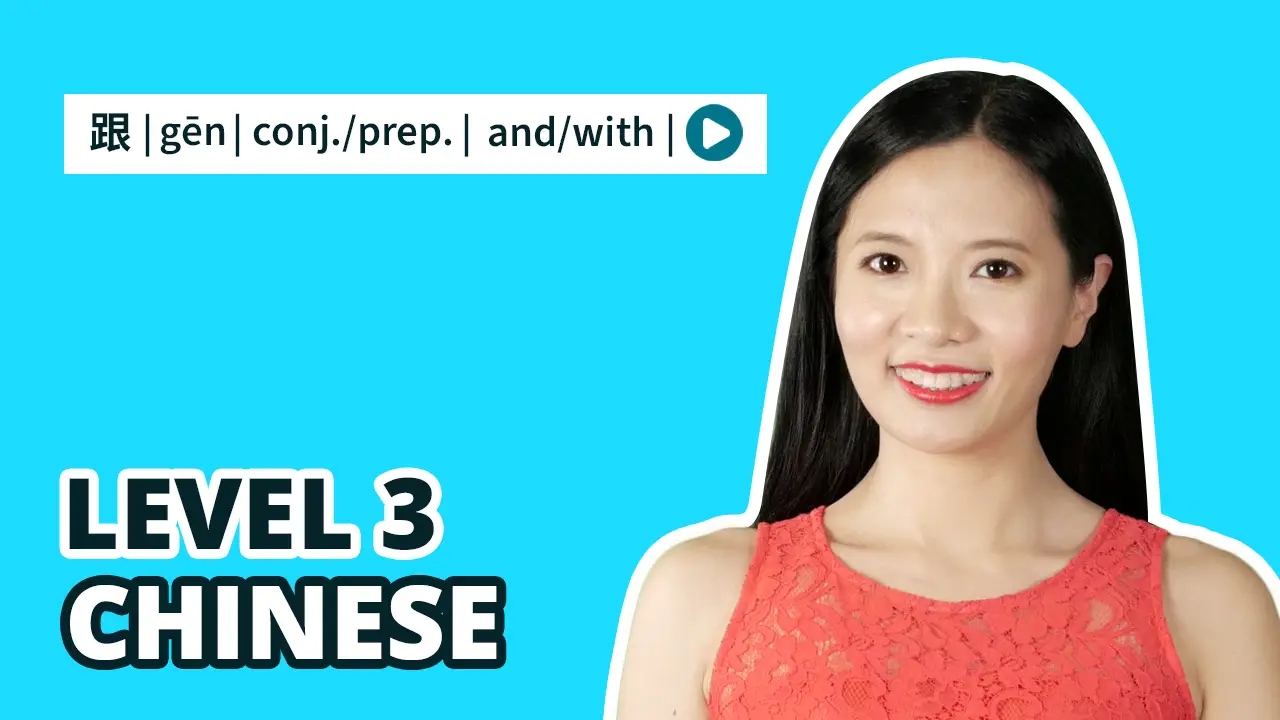Level 3 Lesson 36.2 – 你为我加油我就去参加那个比赛。
GRAMMAR: Chinese Sentence Patterns 1) Simple Sentences; 2) Complex Sentences; 3) Compressed Sentences or Contracted Sentences
In this HSK 3 video lesson we'll learn about Chinese Sentence Patterns. There are three types:
- 单句 (dānjù ▸ Simple Sentences)
- 主谓句 (zhǔwèijù Subject-Predicate Sentences)
- 主语(zhǔyǔ Subject) + 谓语(wèiyǔ Predicate)
- 主语(zhǔyǔ Subject) + 谓语(wèiyǔ Predicate) + 宾语(bīnyǔ Object)
- 非主谓句 (fēi zhǔwèijù Non-Subject-Predicate Sentences)
- 无主句 (wúzhǔjù Zero-Subject Sentences)
- 独词句 (dúcíjù One-Word Sentences)
- 主谓句 (zhǔwèijù Subject-Predicate Sentences)
- 复句 (fùjù ▸ Complex Sentences)
- 紧缩句 (jǐnsuōjù ▸ Compressed Sentences or Contracted Sentences)
GRAMMAR
Grammar 1. 单句
Dānjù ▸ Simple Sentence
We have learned before about the differences between a Chinese Simple Sentence and a Chinese Complex Sentence.
In Chinese, there are two types of Simple Sentences. A typical Chinese Simple Sentence has a Subject, a Predicate and sometimes an Object as well, these type of Simple Sentences are called Subject-Predicate Sentences. Simple Sentences that do not follow the Subject-Predicate Sentence pattern are called Non-Subject-Predicate Sentences.
In summary, Chinese Simple Sentences can have the following different types:
- 主谓句 (Zhǔwèijù ▸ Subject-Predicate Sentences)
- 主语(zhǔyǔ ▸ Subject) + 谓语(wèiyǔ ▸ Predicate)
- 主语(zhǔyǔ ▸ Subject) + 谓语(wèiyǔ ▸ Predicate) + 宾语(bīnyǔ ▸ Object)
- 非主谓句 (Fēi Zhǔwèijù ▸ Non-Subject-Predicate Sentences)
- 无主句 (wúzhǔjù ▸ Zero-Subject Sentences)
- 独词句 (dúcíjù ▸ One-Word Sentences)
(1) Subject-Predicate Sentences: Subject + Verb Predicate
Sentences like this are called 单句, Simple Sentence.
- Huìyì sān diǎn jǔxíng.
会议三点举行。
(The) meeting (will at) 3 o’clock (be) held. - Wǒ hàipà.
我害怕。
I am-scared.
(2) Subject-Predicate Sentences: Subject + Verb Predicate + Object
- Wǒ cānjiā le yí ge huìyì.
我参加了一个会议。
I joined one “ge” (of) meeting. - Tā yùdào le zhè ge jīhuì.
他遇到了这个机会。
He encountered this “ge” (of) opportunity.
(3) Non-Subject-Predicate Sentences: Zero-Subject Sentences
We have learned about Zero-Subject Sentences before, it's also a type of Chinese Simple Sentence. But a Zero-Subject Sentence does not have a Subject. For example,
- Xià yǔ le.
下雨了。
(It is) going-down rain. - Yí kè zhōng le.
一刻钟了。
(It has been) 15 minutes (already).
(4) Non-Subject-Predicate Sentences: One-Word Sentences
Another type of special Chinese Simple Sentence that does not follow the Subject-Predicate structure is One-word Sentence. For example,
- Jiāyóu!
加油!
Come on! - Suànle.
算了。
Forget (it).
Grammar 2. 复句
Fùjù ▸ Complex Sentences
A Chinese Complex Sentence has more than one Simple Sentence in it. The Simple Sentences in a Complex Sentence is called a Clause.
Clauses are usually linked together by 关联词(Guānliáncí ▸ Connectives), for example,
不但……,而且……。
- Tā búdàn qù guo hěn duō guójiā, érqiě huì hěn duō zhǒng yǔyán.
他不但去过很多国家,而且会很多种语言。
He not-only (has) been-to very many countries, (but) also (he) knows-how(-to-use) very many types (of) languages.
因为……,所以……。
- Yīnwèi dàjiā dōu zài wèi wǒ jiāyóu, suǒyǐ wǒ tèbié kāixīn.
因为大家都在为我加油,所以我特别开心。
Because everyone all is cheering-on for me, so I (am) especially happy.
虽然……,但(是)……。
- Suīrán wǒ hěn liǎojiě tā, dàn zhè jiàn shì wǒ bù zhīdào tā huì bu huì tóngyì.
虽然我很了解他,但这件事我不知道他会不会同意。
Though I very(-well) know him, but this “jian” (of) thing (-) I (do) now know (that) he will (or) not will agree/approve.
如果……(的话),就……。
- Rúguǒ míngtiān xià yǔ (dehuà), wǒmen jiù bù jǔxíng yùndònghuì le.
如果明天下雨(的话),我们就不举行运动会了。
If tomorrow (it) goes-down rain, we “then” (will) not hold (the) sports-meeting.
只要……,就……。
- Zhǐyào jīnglǐ tóngyì, nǐ jiù kěyǐ cānjiā miànshì.
只要经理同意,你就可以参加面试。
As-long-as (the) manager agrees/approves, you “then” can take-part-in (the) interview.
先……,再……,然后……,最后……。
- Chūchāi yǐqián, tā xiān qù yínháng qǔ le diǎnr qián, zài zài wǎngshang dìng hǎo jīpiào, ránhòu zhǔnbèi hǎo le xínglixiāng, zuìhòu dìng hǎo le nà tiān zǎoshang qù jīchǎng de chūzūchē.
出差以前,他先去银行取了点儿钱,再在网上订好机票,然后准备好了行李箱,最后订好了那天早上去机场的出租车。
(In the) time (that is) before going-on-business-trip, he first went-to (the) bank to withdraw “a little bit” (of) money, then on (the) Internet-surface (he) booked-well-(and ready) (the) plane-ticket, after-that (he) prepared-well-(and ready) (the) luggage-case, (in the) end (he) booked-well (the) taxi to go to (the) airport (of) that day morning.
是……,还是……?
- Xuǎnzé yí fèn gōngzuò de shíhou, nǐ juéde shì gōngzī gèng zhòngyào, háishì xìngqù gèng zhòngyào?
选择一份工作的时候,你觉得是工资更重要,还是兴趣更重要?
(At the) time (of) choosing (a) job, you think (that it) is salary (that is) more important, or (it is) interest (that is) more important?
To summarize, a Chinese Complex Sentence
- is composed of two or more Simple Sentence, or Clauses
- each Clause expresses their own “individual meaning” but these meanings are related
- the Complex Sentence as a whole expresses a complete meaning
Grammar 3. 紧缩句
Jǐnsuōjù ▸ Compressed Sentences; Contracted Sentences
In Chinese, Compressed Sentence are also called Contracted Sentences. A Chinese Compressed Sentence is like so:
- It follows the structure of a Simple Sentence: there is no pause in the sentence
- but it can (in the same way a Complex Sentence does) express
- “two related independent meanings”
- “a whole complete meaning”
- it usually uses “conjunctive words” such as an adverb, or a pair of adverbs, to compress, or contract the “two independent parts together”, for example
- ……就……
- 越……越……
- 一……就……
Below are example sentences:
……就……
- Nǐ yǒu bù dǒng de dìfang jiù wèn lǎoshī.
你有不懂的地方就问老师。
(If) you have aspects (that you do) not understand “then” (you) ask (the) teacher. - Wǒ bú zài kāfēiguǎn jiù zài qù kāfēiguǎn de lù shang.
我不在咖啡馆就在去咖啡馆的路上。
(If) I not am-in (the) coffee-house “then” (I) am-on (the) road-surface to go-to (the) coffee-house.
越……越……
- Tā yuè xué yuè duì zhè zhǒng yǔyán gǎnxìngqù.
他越学越对这种语言感兴趣。
The-more he learns the-more (he is) interested in this type (of) language. - Shēntǐ yuè bù hǎo yuè yào duō yùndòng.
身体越不好越要多运动。
The-more not-good (one’s) body (is) the-more (one) should much do-exercise.
一……就……
- Tā yì cānjiā kǎoshì jiù hàipà.
他一参加考试就害怕。
As-soon-as he takes-part-in (a) test “then” (he) is-scared. - Gēge yí bù gāoxìng jiù duì wǒ shēngqì.
哥哥一不高兴就对我生气。
Every time (my) big-brother (gets) unhappy “then” (he) take it on me.
